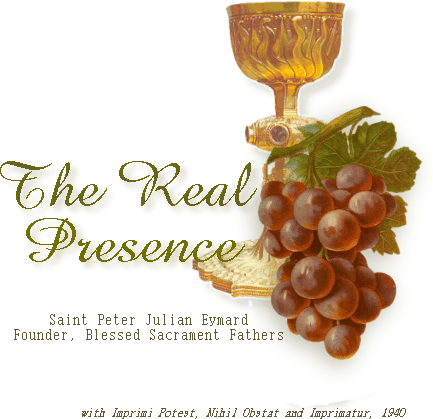

THE DIVINE BRIDEGROOM OF THE CHURCH
Christus dilexit Ecclesiam.
Christ loved the Church. (Ephesians v. 25.)
I
ANOTHER motive for the institution of the Eucharist is the love of Jesus Christ for His Church.
Our Lord, after coming down from Heaven to constitute and found His Church, died for her on the Cross. She came out of His opened side with the Blood and water that escaped therefrom-----a second Eve fashioned from the body of the second Adam. The object of all the actions and sufferings of Jesus Christ was to acquire for His Church an infinite treasure of graces and merits, which she might dispose of in favor of her children.
The Church inherited this treasure. But if Jesus intended returning to Heaven after His Resurrection and contenting Himself with making His Church the trustee of His truth and graces, the Church would be here below but a bride in mourning, weeping over the loss of her Divine Bridegroom.
This could not be. It would be unworthy of the power and love of the Savior. Jesus will remain with the Church to be her life, her power, and her glory.
II
THE life of a bride far from her bridegroom is not a life, but an agony, a mourning. But by the side of her beloved, the bride is generous and strong; she is happy. His heart is hers, and it is a joy for her to devote herself to his service.
Such is the Church in the presence of the Eucharist.
The Eucharist is the object of her love, the center of her heart, the joy and happiness of her life.
Through her children she watches day and night at the feet of the God of the tabernacle to honor Him, love Him, and serve Him. The Eucharist is the motive and end of all her worship. It is the soul of it. Take away the Eucharist, and her worship ceases; for it has no longer any reason to be.
The Protestant sects are not blessed with the presence of the Divine Bridegroom; they accordingly give up all exterior worship as superfluous and useless.
III
THE Church is powerful and fruitful through the Eucharist. Her children can no longer be counted and are scattered all over the world. Missionaries give new children to her every day. She must become the mother of the human race.
But whence does her fruitfulness come? Is it from Baptism, or Penance? No doubt these Sacraments bestow life or restore it; but what will become of these children who have been born in the waters of Divine regeneration?
They must be fed and reared. They have a seed of the Divine in them. This must be developed and made to grow. The Eucharist is the means through which the Church forms Jesus Christ in her children.
The Eucharist is the living Bread with which she sustains their supernatural life. She educates them through the Eucharist; for in the Eucharist alone do souls find abundance of light and life, and the strength to practice every virtue.
Agar sorrowed in the wilderness over her being unable to quench the thirst and satisfy the hunger of her child who was on the point of dying from exhaustion. The Synagogue and the Protestant sects are that mother: they are powerless to satisfy the wants of their children, who ask for bread and find no one to give them any.
But every morning the Church receives the Bread of Heaven for each one of her children; no one need go without it. Quantum isti, tantum ille.
It is the Bread of Angels, the Bread of kings; her children are beautiful like the Bread that nourishes them. They have their fill of the Wheat of the elect. They have the right to sit down every day at the royal banquet. The Church always keeps her tables laid; she invites her children, implores them to come and draw therefrom life and strength.
IV
THE Eucharist is the glory of the Church. Jesus Christ, her Spouse, is King. He is the King of glory. His Father has placed a dazzling crown upon His head. But the glory of the Bridegroom is the glory of the bride; the Church, like the beautiful orb of night, reflects the Divine rays of the Sun of glory.
In the presence of the God of the Eucharist, the Church is beautiful on the feast days of her Spouse; she is decked in festive vestments, chants solemn hymns, and invites all her children to gather and honor the God of her heart.
She is happy to give glory to her King and God; her words and appearance almost give us the impression of our having been transported into the heavenly Jerusalem where the angelic court glorifies the immortal King of ages in an everlasting fiesta.
She is triumphant when, on the feast of Corpus Christi, she unrolls her long processions-----the retinue of the God of the Eucharist. She advances like an army in battle array, accompanying its chief. Kings and peoples, the little and the great sing the glory of the Lord Who has made His home in the midst of His Church.
The reign of the Eucharist is the reign of the Church. Where the Eucharist is neglected, the Church has none but unfaithful children, and she will soon have to deplore fresh ruins.
 Contact Us
Contact Us
HOME---------------THE HOLY EUCHARIST DIRECTORY-----------------------BLESSED SACRAMENT VISITS
www.catholictradition.org/Eucharist/real-presence17.htm